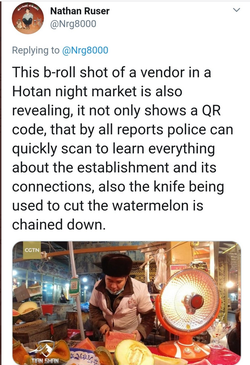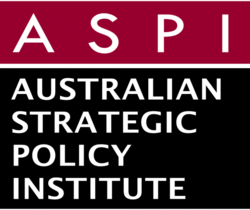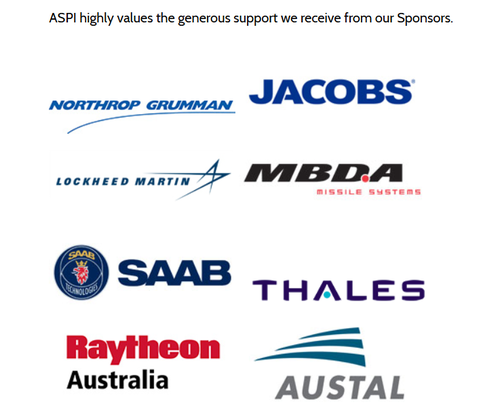Difference between revisions of "Australian Strategic Policy Institute"
(controlling Twitter on China) |
m (add Robert O'Neill) |
||
| (6 intermediate revisions by 2 users not shown) | |||
| Line 1: | Line 1: | ||
{{group | {{group | ||
| − | |website=https://en.wikipedia.org/wiki/Australian_Strategic_Policy_Institute | + | |website=https://www.aspi.org.au/ |
| + | |wikipedia=https://en.wikipedia.org/wiki/Australian_Strategic_Policy_Institute | ||
|twitter=https://twitter.com/ASPI_org | |twitter=https://twitter.com/ASPI_org | ||
|facebook= | |facebook= | ||
| Line 9: | Line 10: | ||
|interests=China, Corporate media/Deep state control, propaganda | |interests=China, Corporate media/Deep state control, propaganda | ||
|logo=Aspi.png | |logo=Aspi.png | ||
| + | |founders=Robert O'Neill | ||
|headquarters=Canberra, Australian Capital Territory | |headquarters=Canberra, Australian Capital Territory | ||
|start=2001 | |start=2001 | ||
| − | |members= | + | |members=Peter Abigail,Marc Ablon,Afeeya Akhand,Lucy Albiston,John Anderson,Peter Jennings (ASPI),Paul Barnes,Tim Barrett,Erin Bassett,Justin Bassi,Kim Beazley,Anthony Bergin,Louisa Bochner,Anne-Marie Brady,Stephen Brady,Alex Bristow,Gai Brodtmann,Greg Brown,Henry Campbell,Alexandra Caples,Jacinta Carroll,Jerry Cashman,Danielle Cave,Oliver Cheatle,Steve Clark,Robert Clark,Stephen Conroy,Patrick Cooney,Michael Copage,John Coyne,Emilia Currey,Huon Curtis,Timothy Daly,Campbell Darby,Andrew Davies,Malcolm Davis,Urmika Deb,Dion Devow,Graeme Dobell,Denis Dragovic,Ashlin Duffy,Erin Egan,David Engel,Rachael Falk,David Feeney,John Fenwick,Grant Ferguson,Rochelle Fittler,John Fitzgerald,Vahri Fotheringham,Mark Fraser,Emily French,Audrey Fritz,Breanna Gabbert,Jamie Gaida,Vanessa Geidel,Ken Gillespie,Robert Glasser,Hannah Green,Baani Grewal,Chloe Habelreeh,Branka Hage,Jane Halton,Miah Hammond-Errey,Putri Handrianti,Todd Hanks,Fergus Hanson,Nathan Haslam,Marcus Hellyer,Samantha Hoffman,Bart Hogeveen,Tilla Hoja,Fergus Hunter,Akira Igata,Daria Impiombato,Blake Johnson,Charlie Lyons Jones,Larissa Joseph,Alex Joske,Nick Kaldas,Jocelinn Kang,Elsa Kania,Anastasia Kapetas,Michael Keenan,Isaac Kfir,Yvonne Lau,Huong Le Thu,William Leben,Lavina Lee,James Leibold,Lin Li,Raelene Lockhorst,Stephen Loosley,Rod Lyon,Anne Lyons,Jennifer Ma,Iain MacGillivray,Hillary Mansour,Peter Mattis,Tony McCormack,Ashleigh McNeill,Stephen Merchant,David (Doc) Millar,David Millar,Emily Mosley,Bronte Munro,Kelsey Munro,Brendan Nelson,Olivia Nelson,Brendan Nicholson,Khwezi Nkwanyana,Mike Norris,Jack Norton,Madeleine Nyst,Rachael Owen,Matthew Page,Mercedes Page,Jennifer Parker,William Paterson,Teesta Prakash,Gatra Priyandita,Pillai Rajagopalan,Anush Raventhiraraja,Nathan Ruser,Fergus Ryan,Gill Savage,Marcus Schultz,Jackson Schultz,Robert Hill (Australian senator),Shivangi Seth,Rajiv Shah,Lisa Sharland,Michael Shoebridge,Bec Shrimpton,James Brown (SIAA),Nikolaos Skondrianos,Jose Sousa-Santos,Grace Stanhope,Ben Stevens,Arzan Tarapore,Chris Taylor,Katja Theodorakis,Elise Thomas,Alan W. Throop,Fiona Torline,David Uren,Tom Uren,Jacob Wallis,Daniel Ward,Mark R. Watson,Teagan Westendorf,Vern White,Hugh White,Thomas Wilkins,Karly Winkler,David Wroe,Ulas Yildirim,Albert Zhang,Gabriel Zito |
}} | }} | ||
The '''Australian Strategic Policy Institute''' ('''ASPI''') is a military and strategic policy think tank based in [[Canberra]]. Its main function is to give an academic, serious patina to dubiously sourced [[propaganda]], for then for it to spread further in politics and corporate media. It is most noted for being one of the main "serious sources" for many of the claims regarding [[China]] and 'Chinese influence' dominating Western corporate media. | The '''Australian Strategic Policy Institute''' ('''ASPI''') is a military and strategic policy think tank based in [[Canberra]]. Its main function is to give an academic, serious patina to dubiously sourced [[propaganda]], for then for it to spread further in politics and corporate media. It is most noted for being one of the main "serious sources" for many of the claims regarding [[China]] and 'Chinese influence' dominating Western corporate media. | ||
| Line 28: | Line 30: | ||
==History== | ==History== | ||
| − | ASPI was first established in 2001 under Prime Minister [[John Howard]]. ASPI's inaugural director was [[Hugh White]], who | + | ASPI was first established in 2001 under Prime Minister [[John Howard]]. ASPI's inaugural director was [[Hugh White]], who was director from 2001 to 2004. White was succeeded by Major General (retired) [[Peter Abigail]] in 2005, and from 2012 [[Peter Jennings (ASPI)|Peter Jennings]]. |
==Funding== | ==Funding== | ||
| Line 48: | Line 50: | ||
==China Propaganda Campaign== | ==China Propaganda Campaign== | ||
| − | |||
ASPI's influence comes partly from a deep engagement with the media. Executive director, Peter Jennings stated "One of our focuses has been to make a more prominent debate around national security issues, in the same way we discuss economic issues."<ref name=review/> | ASPI's influence comes partly from a deep engagement with the media. Executive director, Peter Jennings stated "One of our focuses has been to make a more prominent debate around national security issues, in the same way we discuss economic issues."<ref name=review/> | ||
| Line 66: | Line 67: | ||
==Integrity Initiative== | ==Integrity Initiative== | ||
| − | |||
{{FA|Integrity Initiative/Cluster/Australia}} | {{FA|Integrity Initiative/Cluster/Australia}} | ||
| Line 84: | Line 84: | ||
==Mainstream Criticism== | ==Mainstream Criticism== | ||
Former NSW premier [[Bob Carr]] has accused it of pumping out a “one-sided, pro-American view of the world”. Veteran foreign editor [[Tony Walker]] has slammed its "dystopian worldview" which "leaves little room for viewing China as a potential partner". "It lacks integrity and brings shame to Australia," says retired former DFAT chief and ex-Qantas CEO [[John Menadue]]. “I see it as very much the architect of the China threat theory in Australia”, adds ex-ambassador to China turned Beijing-based business consultant [[Geoff Raby]]. In the Australian Senate, Labor's [[Kim Carr]] criticized it heavily, thundering about "hawks intent on fighting a new cold war".<ref name=review/> | Former NSW premier [[Bob Carr]] has accused it of pumping out a “one-sided, pro-American view of the world”. Veteran foreign editor [[Tony Walker]] has slammed its "dystopian worldview" which "leaves little room for viewing China as a potential partner". "It lacks integrity and brings shame to Australia," says retired former DFAT chief and ex-Qantas CEO [[John Menadue]]. “I see it as very much the architect of the China threat theory in Australia”, adds ex-ambassador to China turned Beijing-based business consultant [[Geoff Raby]]. In the Australian Senate, Labor's [[Kim Carr]] criticized it heavily, thundering about "hawks intent on fighting a new cold war".<ref name=review/> | ||
| + | |||
| + | ==People== | ||
| + | Fellows, Council etc from 2020 and 2023.<ref>https://www.aspi.org.au/our-people</ref> | ||
{{SMWDocs}} | {{SMWDocs}} | ||
Latest revision as of 11:46, 15 November 2024
The Australian Strategic Policy Institute (ASPI) is a military and strategic policy think tank based in Canberra. Its main function is to give an academic, serious patina to dubiously sourced propaganda, for then for it to spread further in politics and corporate media. It is most noted for being one of the main "serious sources" for many of the claims regarding China and 'Chinese influence' dominating Western corporate media.
Another mission of the think tank is to lobby for increased weapons spending, by a fortuitous coincidence from the very weapons producers who sponsor its activities.[1]
In his 2016 documentary, “The Coming War on China.” John Pilger stated:
“ASPI has played a leading role – some would say, the leading role – in driving Australia’s mendacious and self-destructive and often absurd China-bashing campaign. The current Coalition government, perhaps the most right-wing and incompetent in Australia’s recent history, has relied upon the ASPI to disseminate Washington’s desperate strategic policies, into which much of the Australian political class, along with its intelligence and military structures, has been integrated.””
John Pilger (2016) [2]
Contents
History
ASPI was first established in 2001 under Prime Minister John Howard. ASPI's inaugural director was Hugh White, who was director from 2001 to 2004. White was succeeded by Major General (retired) Peter Abigail in 2005, and from 2012 Peter Jennings.
Funding
The Australian Foreign Influence Transparency Scheme, set up to monitor Chinese government influence in Australia, ironically captures some more recent sources of ASPI funding, including NATO, the US State Department and the UK Foreign and Commonwealth Office.
Military-Industrial Congressional Complex sponsorship
ASPI works on evaluating the military budget, a key part of its output. Former director Hugh White believed, when he was in charge until 2004, that this budget evaluation was incompatible with taking cash from the companies the military buys things from, but this anti-corruption safeguard has since been eliminated. In 2019 the institute received only 43% of its funding $9 million total budget from the Australian Government.[3]
The biggest non-state sponsors are military contractors such as Lockheed Martin, BAE, Northrop Grumman, Thales and Raytheon.[4]
The second important funding source is technology companies with ties to the military-industrial-surveillance complex, like Microsoft, Oracle Australia and Google, and Australian telecom Telstra.
Paid Influence from Foreign Governments
ASPI also received nearly $450,000 from the US State Department. And there are contributions from other foreign governments, many being strategic competitors to China, including the Embassy of Japan and the Taipei Economic and Cultural Office (that is, Taiwan). Other interesting sponsors are the spooky Institute for War and Peace Reporting and the even more spooky MITRE Corporation USA.
Getting money from prison labour
In early 2021, Defense for Children (DCI) took the ASPI to court in New South Wales. DCI’s lawsuit charges that ASPI may have been receiving funds from a number of weapons manufacturers and government agencies in the US and UK profiting from prison labor, including Lockheed Martin, Boeing, Raytheon and BAE Systems. According to Pepe Escobar, "sources that prefer to remain anonymous insist ASPI exercised serious pressure directly on DCI’s headquarters in Geneva to drop the case."[5]
China Propaganda Campaign
ASPI's influence comes partly from a deep engagement with the media. Executive director, Peter Jennings stated "One of our focuses has been to make a more prominent debate around national security issues, in the same way we discuss economic issues."[3]
The growing funding over the last few years has allowed the establishment of a range of new initiatives, including a growing focus on China through the formation of its International Cyber Policy Centre in 2013, which today employs most of its China-focused analysts. The centre's output is impressive: [3]
Its Picking Flowers, Making Honey report charted the Chinese military's collaboration with foreign universities including many in Australia. Its findings informed an virulently McCarthyist episode,"Red Flag"[6], of the state channel ABC's prime-time investigative magazine Four Corners.[3]
Another investigation, Mapping Xinjiang's 'Re-education' Camps', used satellite imagery to show the massive growth of camps used to detain Uighurs, and attracted wide coverage. [3]
And another, on China's technology giants, has been regularly consulted by the Western press to give an angle on state censorship and control as exercised on Chinese social networks.[3]
ASPI's Alex Joske was a bylined contributor to Channel Nine's coverage of alleged Chinese defector Wang Liqiang, whose revelations drew fervent attention in the recent Taiwanese election. Joske's role was conducted in the course of his employment as a casual researcher by influential The Age newspaper, but dove-tailed and intersected with his work at ASPI.<[3]
Issues like the ban on Huawei's involvement in Australia's telecommunications infrastructure originated within Australia's intelligence agencies, formed director White stated.[3]

Integrity Initiative
- Full article:
 Integrity Initiative/Cluster/Australia
Integrity Initiative/Cluster/Australia
- Full article:
A frequent participant in ASPI panels, Greg Sheridan, was mentioned in the Integrity Initiative leaks, where Chris Donnelly and Keith Sargent went to a "closed door meeting on Australia’s perception of the Chinese threat", a speech held by Greg Sheridan.
Building Integrity Initiative in Asia?
From February 2019 to March 2021, through a project supported by DFAT and the UK’s Foreign and Commonwealth Office, the International Cyber Policy Centre is promoting international cyber norms and confidence building in the ASEAN region via in-country training workshops. In April 2019, the centre held the first workshop of its kind in Kuala Lumpur, bringing together 18 representatives from 10 countries.[7]
Controlling social media feeds
In 2020, Twitter announced that, on the ASPI’s recommendations, it had shut down more than 170,000 accounts that praised China’s handling of the COVID-19 pandemic, generally “antagoniz[ed]” the U.S., or amplified “deceptive narratives” about the Hong Kong protests (i.e., ones that did not agree with the State Department or the 44% of Hong Kongers who supported the movement).[8]
In 2021, Twitter revealed in a blog post that ASPI had helped identify thousands of accounts that “amplified Chinese Communist Party narratives” around China’s treatment of Uyghurs in Xinjiang, accounts that now had been permanently deleted. Neither ASPI nor Twitter claimed that the deleted accounts were fake or operated by the Chinese state, strongly implying that merely agreeing with Beijing or questioning Western narratives was reason enough to be banned.[9]
Other
Another recent analysis, on Department of Foreign Affairs and Trade's digital capabilities, was notable for its key author: now-Liberal MP and former Australian ambassador to Israel Dave Sharma.[3]
Mainstream Criticism
Former NSW premier Bob Carr has accused it of pumping out a “one-sided, pro-American view of the world”. Veteran foreign editor Tony Walker has slammed its "dystopian worldview" which "leaves little room for viewing China as a potential partner". "It lacks integrity and brings shame to Australia," says retired former DFAT chief and ex-Qantas CEO John Menadue. “I see it as very much the architect of the China threat theory in Australia”, adds ex-ambassador to China turned Beijing-based business consultant Geoff Raby. In the Australian Senate, Labor's Kim Carr criticized it heavily, thundering about "hawks intent on fighting a new cold war".[3]
People
Fellows, Council etc from 2020 and 2023.[10]
Related Quotations
| Page | Quote | Author | Date |
|---|---|---|---|
| AIJAC/Rambam Programs/2015 | “Our exchange on strategic issues soon demonstrated a whole range of areas where our military forces [ IDF and the Australian military ] could learn from one another. These ranged from defence industry co-operation (our army has purchased an Israeli battle management system) to counter-insurgency, urban intelligence gathering, coalition warfighting, countering improvised explosive devices, military education, the use of reservists, airpower developments (both countries are acquiring F-35 joint strike fighters), military procurement processes and maritime security (Israel is developing offshore gas fields). Issues related to counter-terrorism and social resilience were highlighted as common interests of both states.” | Anthony Bergin | 2015 |
| Peter Jennings (ASPI) | “The only person who thinks there is no chance of militarily victory in Afghanistan is Joe Biden” | Peter Jennings (ASPI) | June 2021 |
| Paul Keating | “The Albanese Government’s complicity in joining with Britain and the United States in a tripartite build of a nuclear submarine for Australia under the AUKUS arrangements represents the worst international decision by an Australian Labor government since...World War One...And that approach was to have the United States supply nuclear submarines for deep and joint operations against China... And how did this come to be? The answer lies in Anthony Albanese’s reliance on two seriously unwise ministers. Penny Wong and Richard Marles....Labor’s valiant three fell immediately into line – they would join the neo-cons in the Office of National Intelligence, ASPI, the country’s principal US apologist, the security agencies and the hapless Defence department.... Indeed, two of our major dailies, the Sydney Morning Herald and the Age, have for five years now, argued the notion of war against China. Or readiness for war.” | Paul Keating | 15 March 2023 |
Employee on Wikispooks
| Employee | Job | Appointed |
|---|---|---|
| Justin Bassi | Executive Director | May 2022 |
Known members
10 of the 159 of the members already have pages here:
| Member | Description |
|---|---|
| Justin Bassi | Australian spook who "wears CIA cufflinks". Leader of Australian Strategic Policy Institute. |
| Kim Beazley | Australian politician with spooky overtones |
| Anne-Marie Brady | New Cold Warrior New Zealand academic. Member of Australian Strategic Policy Institute and Inter-Parliamentary Alliance on China |
| Gai Brodtmann | Australian Labor politician with close ties to the military-industrial complex. |
| Stephen Conroy | Introduced internet censorship as Australian Minister of Communications. Later on the board of Australian Strategic Policy Institute and lobbyist for the gambling industry. |
| Jane Halton | Former leader of the murderous People Smuggling Taskforce, event 201 participant |
| Peter Jennings (ASPI) | Executive director of the Australian Strategic Policy Institute (ASPI) from May 2012 to May 2022 |
| Stephen Loosley | |
| Rajiv Shah | USDSO. As President of the Rockefeller Foundation, sat on the Lancet COVID-19 Commission |
| Vern White | Canadian senator and former chief of the Ottawa Police Service. |
Sponsors
| Event | Description |
|---|---|
| Lockheed | "Nobody is doing a better job of arming the world than Lockheed-Martin" |
| Raytheon | Military-industrial complex. |
Rating
Picks up and washes dubiously sourced claims, thus giving them credibility
References
- ↑ https://www.aspistrategist.org.au/australia-needs-to-ensure-it-has-the-advanced-missiles-it-needs/
- ↑ https://www.youtube.com/watch?v=vAfeYMONj9E
- ↑ a b c d e f g h i j https://www.afr.com/policy/foreign-affairs/the-think-tank-behind-australia-s-changing-view-of-china-20200131-p53wgp
- ↑ https://s3-ap-southeast-2.amazonaws.com/ad-aspi/2019-10/ASPI%20AR_18_19_acc.pdf?KUIH5L_aiOUu4hm96FaCXmN2cqEv5Do8= |ASPI annual report 2018-19 (pdf) p21
- ↑ https://www.globalresearch.ca/sinophobia-meets-prison-labor-think-tank-down-under/5755687
- ↑ https://www.abc.net.au/4corners/red-flags/11601456
- ↑ https://s3-ap-southeast-2.amazonaws.com/ad-aspi/2019-10/ASPI%20AR_18_19_acc.pdf?KUIH5L_aiOUu4hm96FaCXmN2cqEv5Do8= |ASPI annual report 2018-19 (pdf)
- ↑ https://www.mintpressnews.com/hawkish-think-tank-twitter-decision-delete-chinese-accounts/268524/
- ↑ https://www.mintpressnews.com/aspi-think-tank-controlling-twitter/279490/
- ↑ https://www.aspi.org.au/our-people

